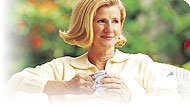Penn Herb Wellness Guide
Alcohol Withdrawal

About This Condition
Alcohol withdrawal is a set of symptoms that occur with the elimination of alcohol when a person is psychologically and/or physiologically addicted to it.
A majority of people who have been drinking alcohol and decide to stop (often for health-related reasons) are able to do so without much trouble. Alcohol withdrawal typically becomes difficult only when problem drinkers—alcoholics—attempt to quit. Almost inevitably, alcoholics need help in achieving this goal. Sometimes, this help requires medical intervention in detoxification centers.
Finding doctors who work with alcohol detoxification is often as easy as calling the local chapter of Alcoholics Anonymous (AA) and asking for referral information. Most programs successful in getting alcoholics to quit drinking are either part of the AA network or employ AA techniques. Natural approaches to alcohol withdrawal should not be a substitute for detox centers or for AA or AA-related programs.
Symptoms
A person typically has a mild to severe hangover that lasts several days. Symptoms may include stomach upset; headache; shakes or jitters; feelings of generalized anxiety or panic attacks; and insomnia that may be accompanied by bad dreams. There may be also be increases in heart rate, breathing rate, and body temperature. In a small proportion of alcoholics, withdrawal may result in severe symptoms, such as hallucinations, delirium tremens (DTs), or generalized seizures.
Healthy Lifestyle Tips
Most experts agree that alcoholics must stop drinking completely in order to overcome the addiction. Moreover, before nutritional supplements can be used, effective treatment of the malabsorption problems requires a complete avoidance of alcohol.
Copyright 2025 TraceGains, Inc. All rights reserved.
Learn more about TraceGains, the company.
The information presented by TraceGains is for informational purposes only. It is based on scientific studies (human, animal, or in vitro), clinical experience, or traditional usage as cited in each article. The results reported may not necessarily occur in all individuals. Self-treatment is not recommended for life-threatening conditions that require medical treatment under a doctor's care. For many of the conditions discussed, treatment with prescription or over the counter medication is also available. Consult your doctor, practitioner, and/or pharmacist for any health problem and before using any supplements or before making any changes in prescribed medications. Information expires December 2025.


